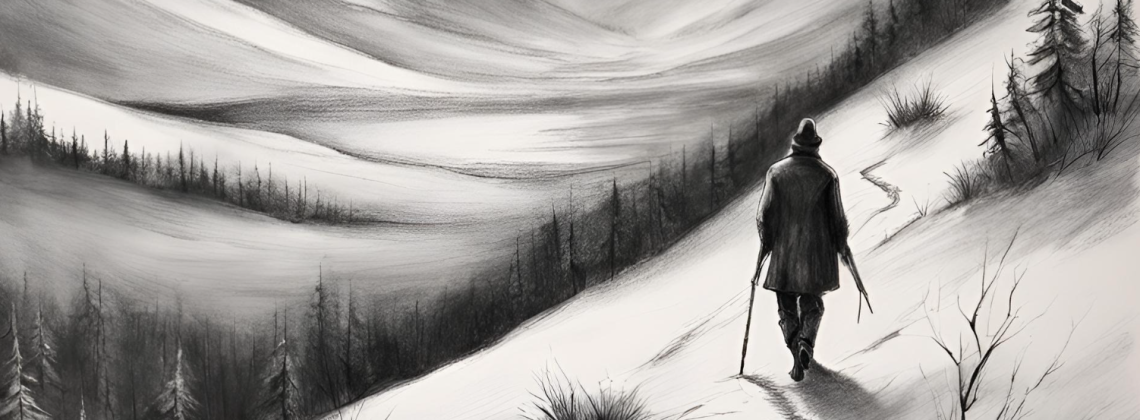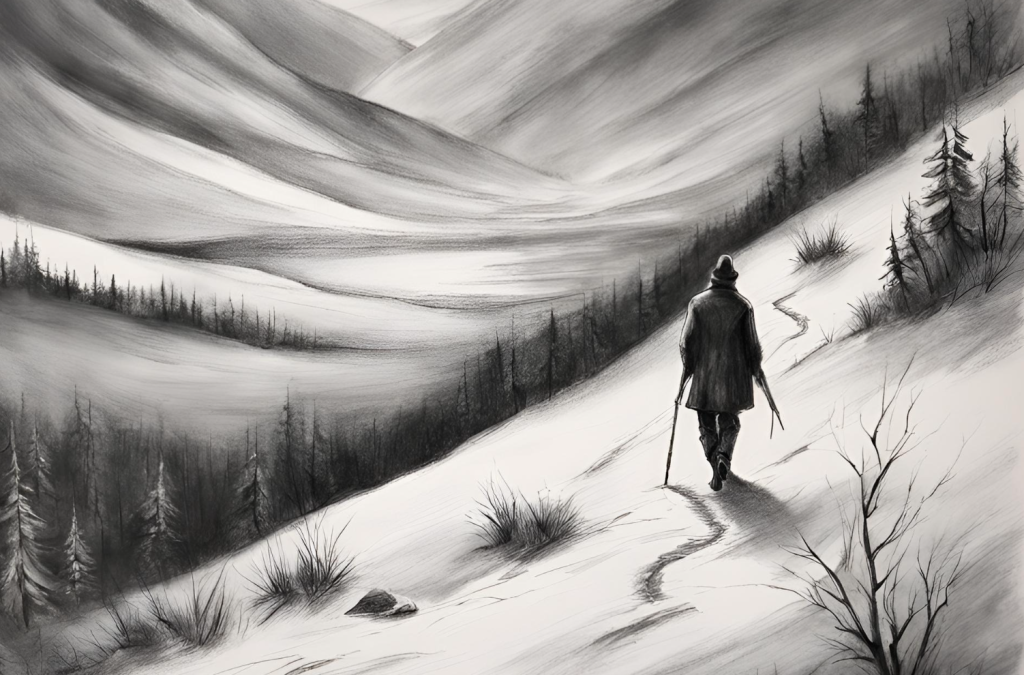

When ideas and dreams beckon
The summer woods ring with joyful songs—the serenading birds, the rushing brook, the rustling leaves. The winter woods, by contrast, seem forlorn, abandoned, blanketed in snowy hush. They seem to invite a lullaby—a song of comfort and maybe a promise that the leaves will yet return, the songs of birds will echo again.
Something about the winter woods, though, lures us in maybe by the primordial loneliness, inviting us to run away from civilization into the wild—or at least to dream momentarily of such an escape. What if I just started walking down this barely visible snowy path, and just kept on walking by the light of the moon? How far will I get? And most importantly, why do such desires occasionally invade the restless heart? This question pervades Franz Schubert’s 1828 song cycle, Winterreise (The Winter Journey).
In twenty-four songs, the cycle tells stories of the wintry woods through the thoughts of one lonely traveler, a troubled young man with an enigmatic past and an uncertain future. A stranger he was when he arrived in this village, he admits in the first song of the cycle. And just as much a stranger he still was when he mysteriously departed in the middle of the night without saying goodbye to anyone, gently and quietly shutting the door behind him forever.
But why? I did not think about this question when I first learned this song in my teens. Beautiful music seemed sufficient on its own merits then. But now the desire to find its deepest meaning won’t let go. Was it love gone wrong? There is a strong hint of this explanation, but perhaps he is mistaken. Or is it that strange adventurous longing to wander that he mentions in that first song of the cycle? And what did setting these longings and questions to music mean to the composer himself, slowly but surely dying of syphilis at age thirty-one just as he was finishing this work that would become his best known masterpiece?
We don’t know what happened to the narrator of the song cycle. At the end, we are left haunted by this uncertainty, reflected in words and music alike. Is there hope for this man, whose very tears of sorrow freeze on his face in the winter air, as one of the songs in the cycle so poignantly describes? Or are the quiet deserted woods of which he sings only a place of sure death, as he seems to hint on occasion? And where is God, the author of the ultimate songs of nature, in all of this? What is the point of singing about the snowy woods, which only seem to judge the singer with their silence? All such songs are good for is making us weep right alongside—for the lonely winter landscape, but more so for this unknown narrator, who seems to have made quite the mess of his life for reasons that remain unclear, and maybe most of all for Schubert himself, a genius dead too young, for reasons that seem to have been entirely his fault.
And yet the woods still beckon stubbornly, insistently calling us to dream. During the first pandemic winter, for a time I was weaving an increasingly elaborate dream that my husband didn’t quite share: If everything in our lives was online anyway, why not just move to Presque Isle, Maine, the northernmost point in the Northeast, and where the cost of housing was less than peanuts. Couldn’t we live a quieter and more fulfilled life amidst the Maine woods? I imagined an old New England home on the edge of town, surrounded by sturdy Maine apple trees. The woods, I imagined in my over-active fantasy, were encroaching on this house, wild neighbors sheltering yet other wilder neighbors—the bears, the deer, the moose. It was these Schubertian birch and linden-filled woods that I was coveting more than anything, their roots taking a hold within my soul.
My dreaming was so active, so insistent, that my husband at one point went so far as to look up houses for sale in Presque Isle. They did not disappoint in either location or price, but my husband was concerned about the isolation the move would entail. Did we really want to live an hour and a half from the nearest big city, cut off from the world possibly for weeks on end by every large snowfall? Maybe we are not cut out for running away from the world like this, he gently suggested.
And so the strange dream receded at some point, visions of Maine winters replaced instead by yet more songs of summer, and most recently the songs of Ohio wheat in my new backyard. But now it is winter again. The woods have grown silent once more. The path in the forest beckons, promising quiet that is an introvert’s idolatrous delight. Here, walk just a little bit further from the lights of the neighborhood, it seems to whisper inaudibly, unfurling further into distance.
Ideas and dreams have much in common, beckoning us to draw deeper into a world inside our head, a world much more complicated and tumultuous than our regular lives of relationships with real people, beautifully loud and messy flesh and blood. In the regular world, though, we sing to people, not woods. A lullaby for a little girl, who clutches her doll as her entire body relaxes into the sound of her mother’s song, drifting off to sleep at last, after insisting for much too long that she really wasn’t tired.
The winter journey is long, uncertain, unfinished. But spring will come to the woods again.
Nadya Williams is the author of Cultural Christians in the Early Church, Mothers, Children, and the Body Politic: Ancient Christianity and the Recovery of Human Dignity, and Christians Reading Classics (forthcoming, Zondervan Academic, 2025). She is Managing Editor for Current, where she also edits The Arena blog.
On this late February morning, I needed this wintry reflection.